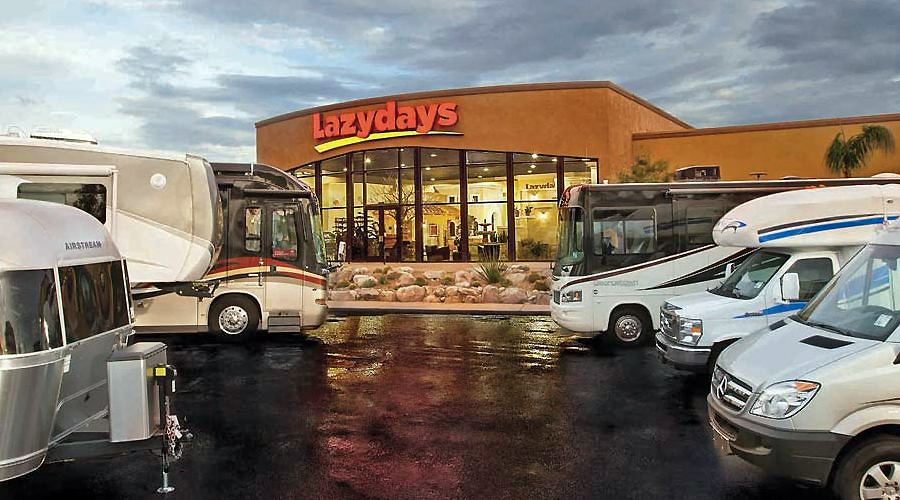According to Statistical Surveys, Inc., U.S. retail year-over-year RV registrations declined 6 percent in April, 10 percent in May and 21 percent in June. While the data could suggest that the trends are deteriorating sequentially, Lazydays Holdings, Inc. cited the information to provide a snapshot more indicative that the seasonal sales increase, typically witnessed in the summer months, has yet to occur this year.
“Our best view is that the second quarter sales trajectory continued in July and most industry experts are pointing to 2025 as the likely inflection for a meaningful industry recovery,” offered Lazydays Holdings, Inc. CEO John North on a conference call with analysts to discuss Q2 results. “So, facing that backdrop, we have continued to focus on the things we can control, maintaining healthy vehicle inventory, improving F&I per unit and achieving substantial total gross margin improvement sequentially from the first quarter.”
Given the quarter’s unit sales volume and financial results, North said that Lazydays Holdings subsequently implemented further cost reductions in August that should be complete by the end of next month. He said these moves should save approximately $25 million annually. He also said the company closed one underperforming location and consolidated two into one close to its Arizona market.
“While portfolio optimization decisions are difficult, they are necessary. Despite these two-store actions, we remain enthusiastic about the rest of our best-in-class locations and will continue to adjust our expense structure as necessary to match the revenue opportunities available,” North said.
North continued that Lazydays remains focused on preserving liquidity, maintaining healthy inventory levels and deferring all non-essential spending.
“We are also pleased to announce that Coliseum Capital Management is committed to advancing another $5 million against their outstanding mortgage facility, which will be a further boost to provide operational flexibility for the fall,” the CEO shared.
Lazydays reported that total revenue for the second quarter was $238.7 million, down 22.6 percent, compared to $308.4 million for the Q2 period in 2023. Total revenue for the six months ended June 30, 2024 was $509.3 million compared to $604.0 million for the same period in 2023.
On a same-store basis, Lazydays said it saw a decline in new and used unit volume relative to the first quarter, partially offset by significantly improved gross profit per unit, reflecting the benefits of the company’s inventory actions earlier this year. As a result, on a same-store basis, the company’s total gross margin improved to 19.4 percent of net sales in the second quarter compared to 14 percent in the first quarter this year.
“Earlier this year, we implemented a consignment option for consumers interested in selling their RV, where we are unable to agree upon a purchase price. We’ve had incredible success with the program as it continues to ramp up and resonate in the marketplace,” explained company CFO Kelly Porter. “Specifically, of the units we sourced from customers, 53 percent of our June units and 61 percent of July units acquired were consignments versus an outright purchase.”
Porter said the sold RV units continue to generate a normalized gross profit but do not incur floor plan expense and do not expose the company to inventory risk because of valuation changes or completed reconditioning work that it cannot recover when the unit is sold.
“Regarding cost control, relative to last year, we are up approximately 1 percent in SG&A expense, despite adding seven locations, or a nearly 30 percent increase in our store count year-over-year,” Porter continued. “The absolute change in SG&A dollars increased by just under $500,000, which is a testament to the team’s effort to find all opportunities to control costs and find expense reductions.
“A particular bright spot [in Q2] was in F&I [finance & insurance], where our same-store result was over $5,300 per unit, up 6.9 percent, despite average selling prices being lower by approximately 17 percent on a blended basis,“ added Porter. “Of note, our finance penetration in the quarter was 75 percent compared to 64 percent in the first quarter.”
Net loss for the second quarter was $44.2 million, or a loss of $3.22 per diluted share, compared to net income of $3.6 million, or EPS of 12 cents per diluted share, for the corresponding period in 2023.
Adjusted net loss, a non-GAAP measure, was $18.4 million, or a loss of $1.42 per diluted share, in Q2, compared to Adjusted net income of $3.9 million, EPS of 14 cents, for the 2023 Q2 period.
Balance Sheet and Strategic Update
Porter said on the call that Lazydays Holdings has continued to focus on maintaining its healthy inventory position while increasing efforts to procure more used units directly from consumers. She shared that trade-ins on vehicle sales in 2024 have been lower by approximately 50 percent compared to the company’s historical averages.
“As of today, our new inventory is comprised of 26 percent model year 2025 units and 69 percent model year 2024 units, with less than 140 2023 units remaining,“ Porter noted. “Also worth highlighting, over 75 percent of our inventory is towable product, up from 70 percent at the same time last year.”
After the end of the second quarter, the Lazydays Holdings executed a temporary waiver related to its required financial covenants as of June 30, 2024. This waiver was approved by 100 percent of the lenders in its syndicated credit facility and provides additional runway to negotiate an amendment to the facility.
Image courtesy Lazydays Holding, Inc.
















